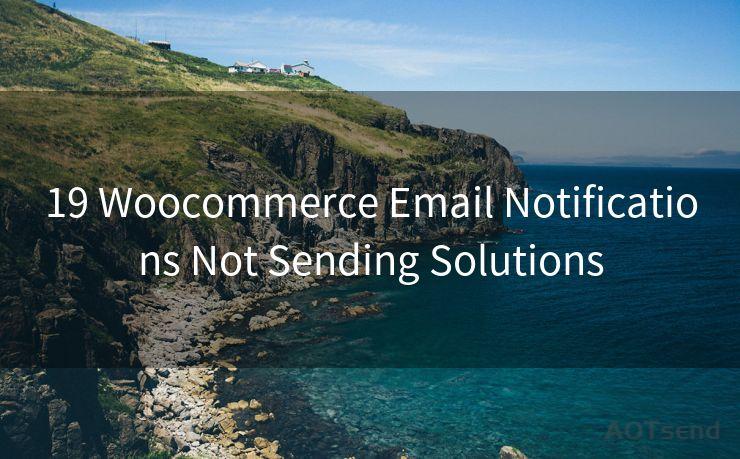19 Woocommerce Email Notifications Not Sending Solutions




When it comes to running an online store with WooCommerce, email notifications are crucial for keeping customers informed about their orders, shipments, and other important updates. However, sometimes these notifications may not be sent due to various reasons. In this article, we'll explore 19 solutions to address the issue of WooCommerce email notifications not sending.
1. Check Email Settings
First and foremost, ensure that your WooCommerce email settings are configured correctly. Go to WooCommerce > Settings > Emails and verify the sender address, SMTP settings, and other relevant configurations.
2. Update WooCommerce and Plugins
Make sure your WooCommerce platform and all related plugins are up to date. Outdated software can cause compatibility issues that may affect email delivery.
3. Check Server Requirements
Ensure your server meets the minimum requirements for WooCommerce and its email functionality. Sometimes, insufficient server resources can hinder email sending.
4. Test Email Sending
Use WooCommerce's built-in email testing feature to see if emails are being sent correctly. This can help identify if the issue lies within WooCommerce or with your email service provider.
5. Check Email Logs
Examine your server's email logs for any errors or bounce messages. These logs can provide valuable insights into why emails are not being sent.
6. SMTP Plugin
Consider using an SMTP plugin to ensure more reliable email delivery. These plugins can help bypass any potential issues with your host's default mail system.
7. Contact Your Host
If you've checked everything on your end and emails are still not sending, contact your web host. They may be able to assist with server-side issues or configurations that could be affecting email delivery.
8. Check Spam Filters
Sometimes, emails from WooCommerce may be mistakenly flagged as spam. Ensure your emails are not being blocked by spam filters on the recipient's side.
9. Email Content
Review the content of your email templates. Certain words or phrases may trigger spam filters, preventing emails from being delivered.
10. Email Delivery Services
Consider using a third-party email delivery service like SendGrid or MailChimp. These services specialize in ensuring high deliverability rates for transactional emails.
11. DNS Settings
Verify your DNS settings, especially if you're using a custom domain for email sending. Incorrect DNS configurations can cause email delivery issues.
12. PHP Mail Function
Check if your server supports the PHP mail() function, which WooCommerce uses to send emails. If not, you may need to configure an alternative method.
13. Email Queue
If you have a large number of emails to send, consider implementing an email queue system to manage the outflow and prevent server overloads.
14. WordPress and WooCommerce Debug
Enable WordPress and WooCommerce debugging to capture any potential errors that may be causing email sending failures.
15. Check Firewall and Security Plugins
Ensure that any firewall or security plugins you have installed are not blocking outgoing emails.
16. Test Different Email Accounts
Try sending test emails to different email accounts to rule out any issues specific to a particular email provider.
17. Review Email Templates
Sometimes, issues with email templates can prevent emails from being sent. Ensure your templates are properly formatted and contain no errors.

18. Clear Caches and Cookies
Clear your WooCommerce and browser caches, as well as cookies, to eliminate any potential conflicts that may be affecting email sending.
19. Seek Professional Help
If none of the above solutions work, consider seeking professional help from a WooCommerce expert or your web developer.
In conclusion, there are multiple potential reasons why WooCommerce email notifications may not be sending. By systematically working through these 19 solutions, you should be able to identify and resolve the issue, ensuring smooth communication with your customers.




🔔🔔🔔
【AOTsend Email API】:AOTsend is a Managed Email Service for sending transactional emails. Support Email Types: reminders, authentication, confirmations, notifications, verification codes, invoices, password resets, account activations, billing statements, two-factor authentication (2FA), and one-time passwords (OTP) emails, etc. $0.28 per 1000 Emails. 99% Delivery, 98% Inbox Rate.
You might be interested in:
Why did we start the AOTsend project, Brand Story?
What is a Managed Email API, How it Works?
Best 25+ Email Marketing Platforms (Authority,Keywords&Traffic Comparison)
Best 24+ Email Marketing Service (Price, Pros&Cons Comparison)
Email APIs vs SMTP: How they Works, Any Difference?
Scan the QR code to access on your mobile device.
Copyright notice: This article is published by AotSend. Reproduction requires attribution.
Article Link:https://www.mailwot.com/p4982.html



